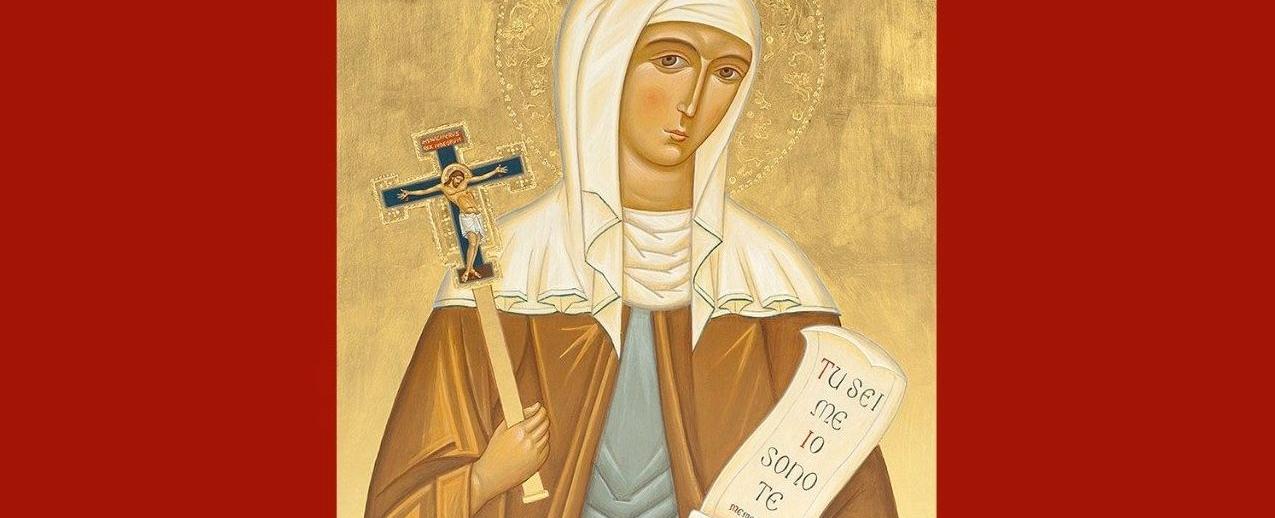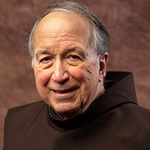St. Angela of Foligno

On January 7th, Franciscans in the United States, especially members of the Third Order tradition, both Secular and Regular, celebrate the memory of St. Angela of Foligno (c. 1248-1309). [In other countries, her feast is January 4th]. Angela was born into a well-to-do family in the city of Foligno, only a short distance from Assisi. She was married as a young woman and her early life was rather carefree and superficial; she dismissed people who were seriously committed to religious activities. However, when she was in her late 30s, she had a vision of St. Francis that caused her to start examining her life. Especially after the death of her family in a plague in 1288, she radically converted her life, formally joining the Brothers and Sisters of Penance (the Franciscan “Third Order”) about 1291. In the years that followed, her friar spiritual director began to write down what Angela told him about her increasingly intense mystical journey. She devoted herself to prayer and the care of the sick and the poor, becoming the center of a group of both women and men that gathered around her as a spiritual guide; she also formed a community of lay women who lived together without religious vows. Because of the vast influence of her spiritual teaching, she became known as the “Teacher of Theologians.” In 2013, Pope Francis confirmed the centuries-long devotion to Angela as a saint.
Angela was born into a well-to-do family in the city of Foligno, only a short distance from Assisi. She was married as a young woman and her early life was rather carefree and superficial; she dismissed people who were seriously committed to religious activities. However, when she was in her late 30s, she had a vision of St. Francis that caused her to start examining her life. Especially after the death of her family in a plague in 1288, she radically converted her life, formally joining the Brothers and Sisters of Penance (the Franciscan “Third Order”) about 1291. In the years that followed, her friar spiritual director began to write down what Angela told him about her increasingly intense mystical journey. She devoted herself to prayer and the care of the sick and the poor, becoming the center of a group of both women and men that gathered around her as a spiritual guide; she also formed a community of lay women who lived together without religious vows. Because of the vast influence of her spiritual teaching, she became known as the “Teacher of Theologians.” In 2013, Pope Francis confirmed the centuries-long devotion to Angela as a saint.
Pope Benedict XVI laid out Angela’s spirituality in a talk in October, 2010. He said: "On Angela's spiritual journey the transition from conversion to mystical experience, from what can be expressed to the inexpressible, took place through the Crucified One. He is the ‘God-man of the Passion’, who became her ‘teacher of perfection’. The whole of her mystical experience, therefore, consisted in striving for a perfect ‘likeness’ with him, through ever deeper and ever more radical purifications and transformations. Angela threw her whole self, body and soul, into this stupendous undertaking, never sparing herself of penance and suffering, from beginning to end, desiring to die with all the sorrows suffered by the God-man crucified in order to be totally transformed in him. “ 'O children of God’, she recommended, ‘transform yourselves totally in the human-God who so loved you that he chose to die for you a most ignominious and all together unutterably painful death, and in the most painful and bitterest way. And this was solely for love of you, O human being.’ This identification also meant experiencing what Jesus himself experienced: poverty, contempt and sorrow, because, as she declared, ‘through temporal poverty the soul will find eternal riches; through contempt and shame it will obtain supreme honor and very great glory; through a little penance, made with pain and sorrow, it will possess with infinite sweetness and consolation the Supreme Good, Eternal God.’”
“ 'O children of God’, she recommended, ‘transform yourselves totally in the human-God who so loved you that he chose to die for you a most ignominious and all together unutterably painful death, and in the most painful and bitterest way. And this was solely for love of you, O human being.’ This identification also meant experiencing what Jesus himself experienced: poverty, contempt and sorrow, because, as she declared, ‘through temporal poverty the soul will find eternal riches; through contempt and shame it will obtain supreme honor and very great glory; through a little penance, made with pain and sorrow, it will possess with infinite sweetness and consolation the Supreme Good, Eternal God.’”
"Dear brothers and sisters, Blessed Angela's life began with a worldly existence, rather remote from God. Yet her meeting with the figure of St Francis and, finally, her meeting with Christ Crucified reawakened her soul to the presence of God, for the reason that with God alone life becomes true life, because, in sorrow for sin, it becomes love and joy. And this is how Blessed Angela speaks to us. Today we all risk living as though God did not exist; God seems so distant from daily life. However, God has thousands of ways of his own for each one, to make himself present in the soul, to show that he exists and knows and loves me. And Blessed Angela wishes to make us attentive to these signs with which the Lord touches our soul, attentive to God's presence, so as to learn the way with God and towards God, in communion with Christ Crucified. Let us pray the Lord that he make us attentive to the signs of his presence and that he teach us truly to live.”
Angela is one of the significant medieval lay Franciscan women treated by Dr. Darleen Pryds in her CFIT Franciscan Heritage volume, "Women of the Streets."
Dominic Monti, OFM
Professor of Franciscan Research in the Franciscan Institute of St. Bonaventure University
Dominic V. Monti, OFM, is a Franciscan Friar of Holy Name Province (USA) and currently professor of Franciscan Research in the Franciscan Institute of St. Bonaventure University. He devoted the greater part of his ministry to teaching the History of Christianity, in particular the history of the Franciscan movement. He has contributed two volumes to the Works of St. Bonaventure series and is author of Francis & His Brothers, a popular history of the Friars Minor.

